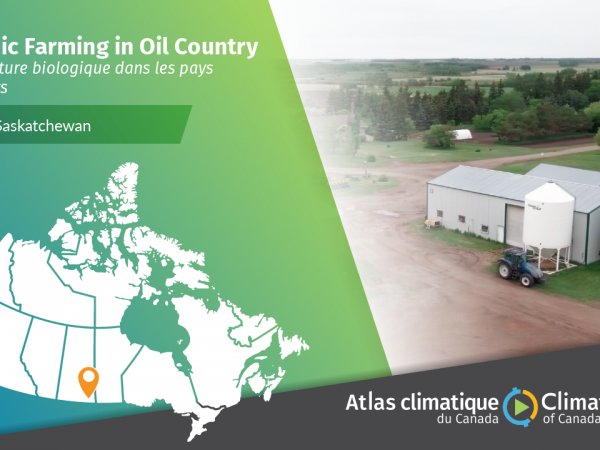Agriculture
From the largest farm to the smallest market garden, agriculture thoroughly depends on climate. Learn more about how crops and livestock will be affected, and how farms and farmers can rise to the challenge of climate change.
From the largest farm to the smallest market garden, agriculture thoroughly depends on climate. Learn more about how crops and livestock will be affected, and how farms and farmers can rise to the challenge of climate change.
Farmers know all too well that agriculture is highly dependent on weather. Modern methods, techniques, and technologies have made today’s crop and livestock farms increasingly productive, but agricultural success still depends on getting just the right amount of rain and just the right amount of sun at just the right time of year.
From the largest farm to the smallest market garden, from planting to eating, and at every stage from choosing seed to trucking livestock, agriculture and agri-business thoroughly depend on climate. And the climate is changing.
Successful farming in the face of climate change will demand the same ingenuity and long-term thinking that are already the bread and butter of farm planning, which frequently includes either short- or long-term transitions to new technologies, techniques, and species of crops or livestock. But that fundamentally resilient and adaptive outlook now has to take into account current and coming changes in climate conditions.
Roy McLaren has a lifetime of farming experience: he’s farmed in southwest Manitoba for over 70 years and lived through the 1930s dustbowl. He has long-term knowledge regarding farming and how to thrive on the land in a respectful way. In conversation with Dr. Ian Mauro, Roy explores the interactive Climate Atlas, and reflects on what extreme heat will mean for farmers, soil and the future of water on the Prairies.
Robin Tunnicliffe has farmed for about 25 years, growing a wide range of organic vegetables for local restaurants and farmer’s markets. When she started farming, there was a more predictable climate, but she is now experiencing more weather extremes that put her farm at risk. To combat the problem, Robin is breeding climate resilient seed that is adapted to her specific growing conditions, which gives her hope for the future.
The Climate Atlas allows you to explore how climate change is likely to impact Canada’s agricultural sector.
Hotter temperatures and changes in precipitation may introduce new risks, while a longer growing season with more heat accumulation and fewer frost days may have some benefits. Of course none of these changes is projected to happen in isolation: the positive likelihood of a longer growing season co-exists with possibly damaging changes in patterns of seasonal precipitation and very high heat.
Darrin Qualman is a writer and researcher – with extensive farming experience – and who has been doing some long-term thinking about agriculture, climate change and energy system. Given the large-scale and costly use of nitrogen fertilizer, fossil fuels and other inputs in agriculture, he has determined that it takes about 13.3 calories to make every calorie we eat. For Qualman, the solutions to climate change and the farm income crisis is to shift away from high-input, high-energy agriculture.
Dr. Amber Fletcher grew up on a farm and has a strong appreciation for farmer knowledge and the importance of rural environments and communities. Now, as an academic at University of Regina, she studies how farmers are seeing and feeling the impacts of climate change in their fields and daily lives. She’s interested in the critical contributions that women make to farm life, especially during climate extremes such as floods and droughts.
Livestock producers Troy Stozek and Don McIntyre – both from southwestern Manitoba – are on the frontlines of farming carbon. By practicing rotational grazing, they’re able to raise more cattle on less land, and in doing so they’re restoring the soil and sequestering carbon from the atmosphere at the same time. Their stories and farming practices show that animal agriculture can be an important part of the climate solution.

Video
Organic Farming in Oil Country
On the frontier of making land sustainable for long term productivity